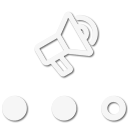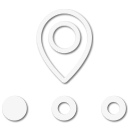Headlamps are very handy, and when combined with a gallon of water (light pointed in) also make cheap lanterns.
First aid kit - and not one of those little ones from the drug store. While most of what you need will be band-aids - in the outback the risk of infection is high and any injury that would be an annoyance can become life-threatening. I would supplement your kit with lots of antiseptic, some large trauma pads, and a few Israeli bandages.
Mountain House meals and a water filter. Keep these in reserve for emergencies or if your planned resupply doesn't happen on schedule. They are also good if you end up with spoilage in your cooler.
Pack of cards and a couple books. - Stuck in the tent in the rain? This helps pass the time.
Short-handled shovel. - Good for recovery and for prepping your camp site. Level a table, scrape rocks away from your sleeping area, dig a rain trench around the tent. A serviceable shovel is cheap and goes a long way. Don't get those cheap Chinesium e-tools, they will bend in all but the softest of soils.
Roll of yard-sized garbage bags. - keep the nasty trash from soaking the Trasharoo, make a poncho, cut one open and cover a nasty Forest Service table before making dinner - the uses of trash bags are nearly endless.
Zip-top bags. - Gallon and 2 Gallon sizes are great for keeping dry gear dry, storing food, segregating smelly socks, you name it.
High-lift jack and
Lift-mate: I've only needed mine once, but it was the only way to get that vehicle unstuck because it didn't have any jack points. If you can't do one of these, at least get a decent bottle-jack to replace the cheap scissor jack most cars come with. Also throw in some scrap plywood or boards as cribbing. If you are going alone, being able to self-recover is vital.
Recovery gear: Closed-loop strap and rated shackles at a minimum. With a high-lift jack you can hand-winch a vehicle, or get someone to pull you out even if they don't have a strap.








